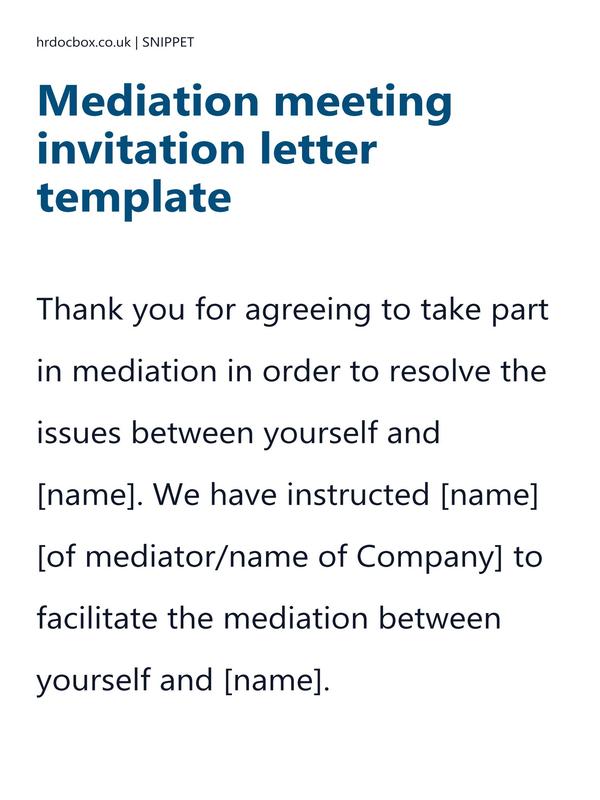Mediation meeting invitation letter template


Our Mediation Meeting Invitation Letter Template facilitates conflict resolution by inviting parties to engage in a structured dialogue process.
- Includes Mediation meeting invitation letter template, plus 12 months’ access with all updates provided free of charge and notified to you.
- UK-specific accuracy.
- 185 words over 1 page.
- Last updated 03/06/2024.
- Format: Word / plain text / email.
- Delivery: Instant download after purchase (no physical item).
- Access: Download link shown here after checkout.
- This Mediation meeting invitation letter template will SAVE you up to 30 mins drafting & research. Save cost. Reduce risk.
[Sender name]
[Sender address]
[date]
[Recipient name]
[Recipient address]
Dear [Recipient first name],
Confirmation of mediation meeting
Thank you for agreeing to take part in mediation in order to resolve the issues between yourself and [name]. We have instructed [name] [of mediator/name of Company] to facilitate the mediation between yourself and [name].
An initial meeting with yourself and [name of mediator] has been scheduled for [date] at [time] in [location] and I would
This is a 30% preview of the Mediation meeting invitation letter template. For instant full access, purchase this item or a parent bundle.
Mediation meeting invitation letter template purpose
The Mediation Meeting Invitation Letter is designed to formally invite involved parties to a mediation session aimed at resolving workplace disputes amicably. It outlines the purpose, date, time, and location of the meeting, encouraging open communication and collaboration towards finding mutually beneficial solutions.
This letter sets the tone for constructive dialogue and conflict resolution, emphasising the importance of mediation in addressing issues professionally and preserving positive working relationships.
It serves as a formal invitation to engage in a mediation process guided by trained mediators, fostering a supportive environment conducive to resolving disputes effectively.
Practical application of a Mediation meeting invitation letter template
- The Mediation meeting invitation letter template should be actioned / delivered as soon as possible after an incident occurs to prompt the use of mediation.
- It is sent / delivered by an employer / HR team to an employee.
Compliance
Compliance
This Mediation meeting invitation letter template incorporates relevant UK laws and HR standards, including those listed below:
Mediation is purely voluntary, you cannot compel an employee to participate.
You can employ either an internal or external mediator.
An in-house mediator should be empowered to resolve the issue and, preferably, be more senior than the parties involved. They are most effective when the dispute is unlikely to result in an employment tribunal claim in the near future.
They must be objective, and the employee must be satisfied with their appointment.
Issues that appear to be headed for tribunal or court procedures, as well as intricate disputes, are best addressed via the use of a qualified external mediator.
Here are some UK employment legislation bullet points that support implementing a mediation meeting invitation letter:
-
The ACAS Code of Practice on Disciplinary and Grievance Procedures recommends that mediation should be considered as an alternative to formal procedures for resolving workplace disputes.
-
The Employment Rights Act 1996 provides for the right to request flexible working arrangements and time off for dependants, which can help to facilitate mediation meetings.
-
The Equality Act 2010 requires employers to make reasonable adjustments for disabled employees, which can include facilitating mediation meetings in an accessible manner.
-
The Health and Safety at Work Act 1974 requires employers to provide a safe working environment, which can include ensuring that mediation meetings are held in a safe and secure location.
-
The Data Protection Act 2018 requires employers to comply with data protection principles when processing personal data of employees, which includes ensuring that any information shared during mediation meetings is handled confidentially and securely.
-
The Employment Relations Act 1999 establishes the legal framework for statutory dispute resolution procedures, including mediation.
Mediation meeting invitation workflow
Mediation meeting invitation workflow
Check which resources should be implemeted before and/or after the Mediation meeting invitation letter template, to understand the workflow.
Managers guide to managing conflict at work through mediation
Our Guide to Managing Conflict at Work through Mediation empowers teams to address workplace tensions effectively, fostering collaboration and harmony.
Mediation meeting script
Our Mediation Meeting Script template guides facilitators through structured conversations, promoting effective communication and resolution during mediations.
Timings
Timings
Follow these best practice actions to get the most from the Mediation meeting invitation letter template, guiding you before, during, and after implementation:
Instantly unlock with a purchase.
Instantly unlock with a purchase.
| Step | Description | Responsibility | Timing (Days from Decision) |
| 1 | Identify Mediation Need: Identify the need for mediation to resolve conflicts or disputes between parties. | HR / Management Team | N/A |
| 2 | Select Mediator: Select a qualified and impartial mediator to facilitate the mediation process. | HR / Management Team | Day 1 |
| 3 | Schedule Mediation Meeting: Coordinate with all parties involved to find a suitable date and time for the mediation meeting. | HR / Management Team | Day 3 |
| 4 | Prepare Mediation Invitation Letter: Create a comprehensive Mediation Meeting Invitation Letter, including the meeting details and objectives. | HR / Management Team | Day 5 |
| 5 | Issue the Invitation Letter: After finalising the letter, issue the Mediation Meeting Invitation Letter to all parties involved, formally inviting them to the mediation meeting. | HR / Management Team | Day 7 (Or as deemed appropriate) |
Practical example
Practical example
Instantly unlock with a purchase.
Instantly unlock with a purchase.
Scenario: Mediation Meeting Invitation
ABC Limited, a UK-based company, is committed to resolving workplace conflicts and disputes in a fair and constructive manner. HR Manager Sarah oversees the process of inviting employees to participate in mediation meetings to address any interpersonal issues or conflicts that may arise.
Identification of Conflict
Sarah becomes aware of a conflict between two employees, Alex and Emily, who are experiencing difficulties in their working relationship. This conflict has led to tension and communication breakdowns, affecting productivity and team morale.
Assessment of the Situation
Sarah conducts an initial assessment of the conflict, gathering information from both Alex and Emily to understand their perspectives and concerns. She identifies mediation as a suitable approach to facilitate open communication and find a mutually acceptable resolution to the conflict.
Selection of Mediator
Sarah selects a trained mediator, either from within the organisation or an external provider, to facilitate the mediation meeting. The mediator is impartial and skilled in conflict resolution techniques, ensuring a fair and balanced process.
Follow-up Actions
Sarah sends the invitation to Alex and Emily via email or printed letter, ensuring that they receive clear instructions on the date, time, and location of the mediation meeting. She remains available to address any questions or concerns they may have and coordinates with the mediator to ensure a smooth and productive mediation process.
Frequently Asked Questions about a Mediation meeting invitation letter template
Frequently Asked Questions about a Mediation meeting invitation letter template
-
Can I use the Mediation meeting invitation letter template in my small business?
Yes. The Mediation meeting invitation letter template is designed to be flexible and suitable for organisations of all sizes, including small businesses and charities. It follows UK employment law best practice, so even if you don't have an in-house HR team, you can confidently apply it.
-
Is the Mediation meeting invitation letter template compliant with 2026 UK employment law?
Absolutely. Like the Mediation meeting invitation letter template, all of our templates are drafted with the latest ACAS guidance and UK employment legislation in mind. We review and update them regularly, so you can be confident they remain compliant.
-
Can I customise the Mediation meeting invitation letter template for my organisation?
Yes, we highlight the areas of the Mediation meeting invitation letter template that you need to update with your own details, and where you need to make decisions to suit your situation. This saves you time and ensures that you meet best practice.
-
Do I get instant access to the Mediation meeting invitation letter template?
Yes. Once purchased, you'll be able to download the Mediation meeting invitation letter template instantly. Templates are provided in editable Word or Excel format so you can customise them easily, and in PDF format for easy sharing.
-
What if I need more help, not just a Mediation meeting invitation letter template?
If you're looking for broader support, we also offer toolkits and library bundles that include the Mediation meeting invitation letter template, along with other HR templates and policies for fully managing your situation. These may be more cost-effective if you need deeper advice.
-
Why should I use this Mediation meeting invitation letter template, and not AI to generate it?
The risk of using a free AI-generated template 'without review' includes your legal exposure, missing context, and no awareness of the wider process, whereas purchasing the Mediation meeting invitation letter template from us mitigates that risk.
